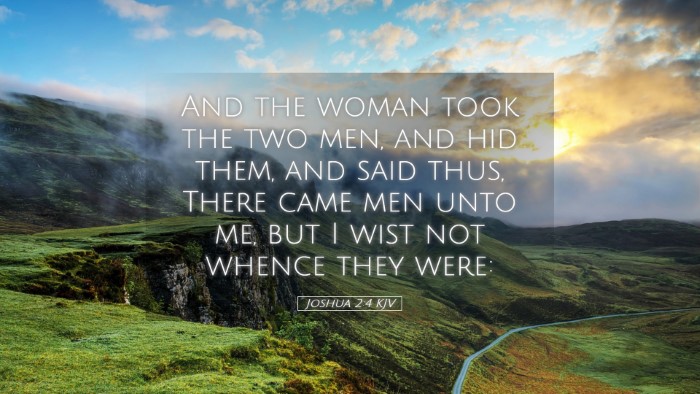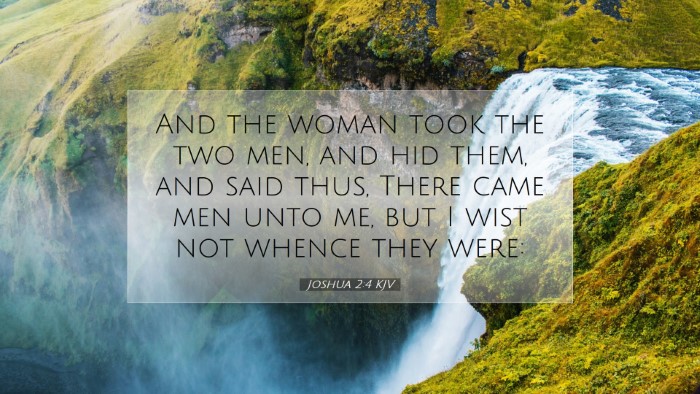Old Testament
Genesis Exodus Leviticus Numbers Deuteronomy Joshua Judges Ruth 1 Samuel 2 Samuel 1 Kings 2 Kings 1 Chronicles 2 Chronicles Ezra Nehemiah Esther Job Psalms Proverbs Ecclesiastes Song of Solomon Isaiah Jeremiah Lamentations Ezekiel Daniel Hosea Joel Amos Obadiah Jonah Micah Nahum Habakkuk Zephaniah Haggai Zechariah MalachiJoshua 2:4
Joshua 2:4 KJV
And the woman took the two men, and hid them, and said thus, There came men unto me, but I wist not whence they were:
Joshua 2:4 Bible Commentary
Commentary on Joshua 2:4
Text of Joshua 2:4 (KJV): "But the woman took the two men, and hid them, and said thus, There came men unto me; but I wist not whence they were."
Introduction
This verse occurs in a pivotal moment within the narrative of Israel’s conquest of Canaan, highlighting the actions of Rahab, a woman of faith who played a significant role in the Israelite story. The complexities of her choices and the implications of her actions present a rich field for theological reflection.
Context and Background
Prior to this verse, we find the Israelites at the brink of entering the Promised Land, and Joshua sending spies to Jericho. The story emphasizes a contrast between Israel's faithfulness and the idolatrous practices of Canaan. The character of Rahab serves as a bridge between these two divergent paths.
Exegesis of Joshua 2:4
In this verse, Rahab's decision to hide the Israelite spies can be viewed from multiple theological perspectives:
- Rahab’s Faith: Matthew Henry notes that Rahab’s actions demonstrate a profound faith in Israel’s God, recognizing the impending judgment upon Jericho (Joshua 2:9-11). This moment showcases her defiance against the status quo and her alignment with God's purposes.
- Deception for Divine Purpose: Adam Clarke presents the idea that Rahab’s lie may be morally complex but is ultimately justified, serving God’s greater plan. This aligns with the biblical theme where human actions yield significant outcomes in fulfilling divine will.
- Protection and Risk: Albert Barnes comments on Rahab’s courage and the risks she took by hiding the spies, a powerful act of faith that could have resulted in severe consequences had she been discovered. This reflects the principle that true faith often requires personal sacrifice.
Character of Rahab
Rahab stands as a remarkable figure throughout scripture, illustrating God’s capacity to use the seemingly unworthy:
- Inclusion in Salvation History: Her placement in the genealogy of Christ (Matthew 1:5) serves as a profound reminder that God’s grace transcends social and moral boundaries, welcoming outsiders into His redemptive story.
- Symbol of Faith: Hebrews 11:31 commends her faith, indicating that her actions were not merely civil disobedience but a response rooted in reverence for God, further emphasized by James 2:25.
Theological Reflections
This verse and its surrounding narrative invite deep theological discourse:
- Faith and Works: The interplay between faith and actions is evident in Rahab’s life. The commentary here underscores the New Testament perspective that true faith manifests through works (James 2:19-26).
- God’s Sovereignty: God’s sovereign choice to work through Rahab signifies His broader plan for redemption, extending beyond Israel to include all nations. This invites theological discussions on predestination and inclusion.
Application for Pastors and Theologians
For modern-day pastors and theologians, Joshua 2:4 offers various applicable lessons:
- Embracing the Marginalized: Just as Rahab, contemporary communities must recognize and embrace those often marginalized by society, reflecting God’s inclusive love.
- Defending Faith in Hostility: Rahab’s example serves as a model of standing firm in faith under pressure, encouraging leaders to guide their congregations to unwavering faith in secular environments.
Conclusion
Joshua 2:4 is a microcosm of the larger biblical narrative, celebrating faith in action and the transformative power of God's grace. It highlights that God can work through anyone, underscoring His will to redeem and embrace all humanity, regardless of their pasts. The story of Rahab evokes hope and assurance that faith, even when complicated by moral ambiguity, can lead to divine purposes being fulfilled.


